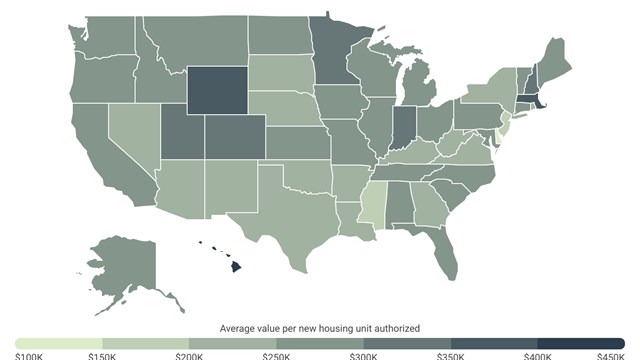For anyone getting a mortgage for a new apartment, a property appraisal is part of the cost of securing their new place. In fact, for existing apartment owners, it’s one of the most important things they can do for their property. An appraisal is usually necessary to insure a building or apartment, or to secure financing for a project or renovation. Before a lender will cut a check, they likely will have the property assessed by a professional appraiser to ascertain its current value.
“Many times the bank requires an appraisal if the person wants a loan,” says Peter Zachary, owner of Peter L. Zachary & Associates, in Brooklyn. “Other times appraisals are done if a person [who owns the property] dies.” An appraisal also might be done if a public corporation owns the property, and needs to account for the value of the property, he adds.
Prices being what they are these days in the Big Apple, the question of the value of a co-op or condo is a relative one. A roomier place might be quite affordable, while a smaller one is pricey. Location is a large part of the equation, as is the question of how much similar neighboring units are selling for currently. A property appraisal can be an excellent tool in assessing the merits of buying or selling a place. It also can be helpful when considering whether or not to do a renovation of an apartment.
Benefits of an Appraisal
One of the main benefits of an appraisal is that it enables a buyer (or seller) to make the right decision in choosing to buy (or sell) a property. Depending upon the market value of the property, it might be a good deal to buy or sell it, or it could be the wrong time for such a move. You can’t truly know what the market value of the property is, though, if you don’t have a current appraisal of the property. Evan an appraisal that is a year or two old might be outdated, given the rapid increases in property values in some places. So having the correct, up-to-date information is key.
“If you are informed, it enables you to make one of the most important decisions in your life,” says Anthony Sarro, owner of Priority Appraisal Services, Ltd. in Bronxville. “An appraisal is an unbiased opinion of value. There aren’t any hidden agendas. It’s also important to have an accurate value in case of fire or water damage.”
While everyone knows you need insurance to protect your property in case of fire, water damage, or some other major problem, many people don’t know what they are responsible for insuring. “With co-ops, the primary policy only picks up to the outside walls,” says Patti Clement, vice-president/managing director of new business for Hub International Northeast. “So the owner is responsible for everything inside. A lot of buyers aren’t aware that they need to insure what’s inside.”
Most new buildings are requiring owners to carry liability coverage, but inside coverage is often an optional thing, adds Clement. “People don’t realize that they need to have that coverage. Each individual should question what he is covered for under his building’s policy,” she says.
Asking the right questions is just part of the process; getting the right answers is the rest of it. Limiting the liability of a homeowner can be part of the goal of an appraisal, Clement says. “[The building is] responsible for common areas, and also if someone gets hurt on the property. Or if someone comes into the building, has a drink and leaves and gets into an accident, it could come back to get you if you served them the drink,” she says.
Homeowners should know that there are extra coverages available for loss assessment, Clement notes. “Another thing that’s important after 9/11 is what’s called ‘loss of use’ coverage,” she says. “It covers you if you have to live outside your apartment for any period of time.”
Renovations and other upgrades to a property need to be addressed through an appraisal, otherwise an owner could lose part of his investment if a fire or other major problem occurrs, says Frank DeLucia, vice president of Hub International Northeast in Long Island. “If you bought a unit and put in a $100,000 floor, you need to have that added on to your personal policy, with an appraisal to back it up,” he says.
But first, you have to know what type of appraisal to order—then you can ascertain the correct value of your property, how to limit your liability, and what coverage to have.
Determining Value
One fact that some property owners don’t know is that all appraisals aren’t the same. That is, property appraisals are done for different purposes. Whether a person is interested in buying, selling or holding onto what she’s got, the right appraisal can help her to accomplish that goal.
Though it might sound odd, a property can have more than one value. When most people think of the value of a property, they are thinking of its market value—that is, what the place could be sold for on the market. A real estate appraisal will determine that value, but that’s not the whole picture.
A property also has a replacement value, determined by an insurance appraisal, which is the cost to replace—in today’s costs—the co-op or condo in the event of a fire, or other catastrophic incident in which the place is destroyed or seriously damaged. The replacement value of an apartment can be well below the market value of the apartment, partly because the market value also includes the land, not just the living space, says Ed Mackoul, president of Mackoul & Associates, a Long Beach-based insurance company. “Often, the shareholder can sell their apartment for a lot more than it would cost to replace the building,” he says.
Determining the value of a property can be something like hitting a moving target. An appraiser determines the value of a property by comparing market prices, by considering sales of comparable properties, and by factoring in projected trends in the market. The most important parts of the appraisal equation are the sale prices of comparable properties, Sarro says.
But how does an owner price an apartment if he plans to sell it? “Generally, it’s best to find out what similar units have sold for,” Sarro says. “Compare apartments to each other. Consider upgrades that have been done, views from the apartment, geographic location, and location of the apartment in the building. People prefer units on higher levels, due to noise, privacy, and pollution.”
If an owner’s building is about to begin a renovation project, the owner should inform her appraiser of the project. “If an appraiser knows about the renovation project, it could be taken into consideration of future projected value,” Sarro says.
Getting the Appraisal
A typical property appraisal would start with a client ordering the appraisal by fax or e-mail, Sarro explains. The appraiser then contacts the broker or homeowner and schedules an appointment for the appraisal. An inspection of the unit and the building is performed, and an assessment of the general condition of the building is made.
The appraiser then researches records on closed sales of similar properties, and selects the most comparable properties. Next, the appraiser does a sales comparison analysis and comes up with an appraised value, Sarro says. Finally, the appraiser’s report is sent to the client.
The cost of a property appraisal can vary widely, given the size of the building, the number of units in the building, and other factors. Some appraisal companies do only buildings of a certain size. Other companies will charge a flat fee, while fewer will charge an hourly rate for an appraisal.
Among companies in the city that do replacement cost appraisals, many charge flat fees for the service. Other companies charge by the hour. Some companies do only appraisals of small brownstones (with three or four units), and charge $525 to $625 for an appraisal. Other companies charge for an appraisal on a per-unit basis; the more units in the building, the less it costs per unit for the appraisal. The fewer units in the building, the more it costs per unit, Mackoul says, noting that such a company recently did an appraisal of a 42-unit building and charged an $1,800 fee.
Other companies that charge a flat fee for an appraisal might consider a number of factors in deciding the cost of the appraisal. Such factors include square footage of the building, the number of buildings in a complex, the location of the building, and the physical state of the building. For such a company, an appraisal of a 40-unit building in Manhattan would cost a flat fee of between $1,500 and $2,000, Mackoul says.
Some other factors that can affect the price of an appraisal include the size of the unit to be appraised, the complexity of the appraisal (due to the specifics of the unit), and the speed in which the appraisal is needed, Sarro says.
In any kind of market, it pays to know the real value of what you’re buying or selling; that’s just good business sense. In the case of real estate—especially in a cutthroat market like New York City—knowing exactly what you’re getting for your money is even more important. The value of an appraisal doesn’t just stop with buyers and sellers, of course. Homeowners looking to keep their insurance coverage current can benefit greatly from knowing exactly what they’ve got—and what they stand to lose in a worst-case scenario.
Jonathan Barnes is a freelance writer and a frequent contributor to The Cooperator and other publications.







Leave a Comment